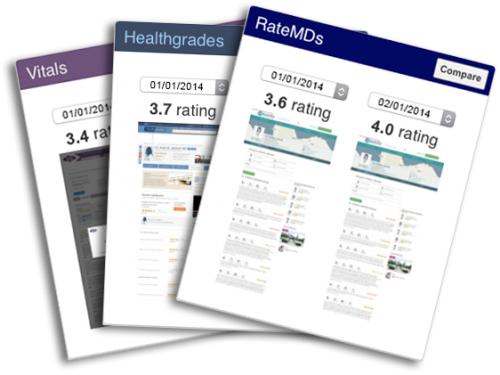Online physician reviews
 Doctors are increasingly rated and evaluated on Internet sites. While some physicians would rather wish these sites away, online physician reviews are likely here to stay. Rather than turn a blind eye to these ratings, doctors should consider monitoring what is being said about them, and take measured steps to deal with these reviews.
Doctors are increasingly rated and evaluated on Internet sites. While some physicians would rather wish these sites away, online physician reviews are likely here to stay. Rather than turn a blind eye to these ratings, doctors should consider monitoring what is being said about them, and take measured steps to deal with these reviews.Online consumer reviews continue to expand and now include a number of websites dedicated to rating physicians. These sites enable patients to view physician profiles, share patient experiences, rate doctors across a number of different factors, and comment on individual doctors and their medical practices. While physician review sites have limitations, patients may use the sites to comment on their physicians' communication skills, timeliness, and follow up of test results. Online reviews can also include information about office staff, with comments on attitudes, and office processes and management. The posted information can be used by patients to share information about their experiences with a particular physician, prepare for a referral visit to a different doctor, or learn more when seeking a new physician.
Strategies to monitor online reviews
While many physicians may be reluctant to search for comments about themselves by using search engines such as Google or Bing, doing so can be valuable. Physician reviews may want to occasionally monitor what is written about them on the web, and pay particular attention to physician rating sites. These sites are generally not intended to harm physicians' reputations. In fact, most physician rating sites allow doctors to update and correct their profile information, and many sites have terms of use requiring only truthful, non-libelous, and relevant postings. Some sites also allow physicians to respond to comments if they choose.
When a physician's online reviews are largely positive — and most are — this is a sign patients are generally satisfied with the care and service received. In these situations, physicians should reflect on the feedback, build upon what works well in their practice, and continue to provide quality care to patients. Physicians should place less emphasis on numerical ratings, since these may not be statistically sound. When negative online reviews and comments are encountered, it may be appropriate to pause and assess the feedback as objectively as possible. Online reviews may provide important insights for doctors. Physicians should generally not reply online to specific patients, even if they feel certain about which patient provided the comment or review, nor should they post any specific comments online.
Resource By : https://www.cmpa-acpm.ca/-/online-physician-reviews-what-s-to-be-done-







Comments